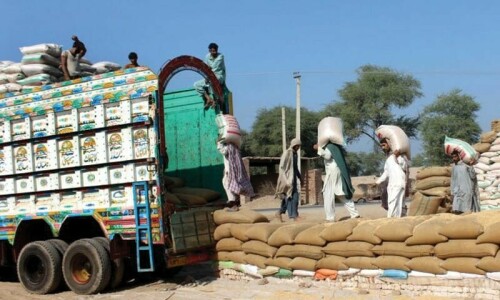LAHORE: University of Engineering and Technology (UET) Vice Chancellor Prof Dr Fazal Ahmad Khalid has emphasised the need for collaboration among public and private sector universities and institutions to promote the culture of research.
“There should be collaboration among institutions like Punjab University, LUMS, PCSIR, COMSAT etc. for the purpose,” said Dr Khalid in his keynote speech at the one-day symposium on nanotechnology, held by the UET Physics Department at the Seminar Hall of Chemical Engineering Department on Wednesday.
The aim of holding the symposium was to provide the latest ideas for the development of nanotechnology -- the manipulation of matter on atomic and molecular scale -- and nano materials to enable the scientists and engineers to contribute to national as well as international progress in this rapidly growing field. The main theme of the symposium was to elucidate the topic of nanotechnology and to motivate the students towards research in the field.
Such symposia and conferences enable the participants to build their understanding of the topic, said Prof Khalid.
There were two technical sessions in the symposium. The first session started with the keynote address by Prof Khalid who emphasised the need for progress and development of nanotechnology and nanomaterials in science and engineering.
Prof Dr Shahzad Naseem, director of Centre for Solid State Physics of the Punjab University, elaborated the correlation between the nanotechnology and solid state physics.
UET Department of Physics Chairman Prof Dr Shahid Rafique introduced the ongoing nanotechnology projects in his department.
Dr Waheed S Khan, principal scientist and group leader of nano biotechnology group in the National Institute for Biotechnology and Genetic Engineering (NIBGE), Faisalabad, explained the role of nano materials in photo catalysis; degradation of organic pollutants using Tungsten Oxide-based nano composite materials as photo catalyst.
Dr Irshad Husain, a researcher at the Lahore University of Management Sciences (LUMS), described how to tune the size, surface chemistry and self-assembly of nano particles for applications in biomedical sciences, energy and environment.
Heads of the departments and faculty members besides students from various universities not only from Lahore but from all over Pakistan participated in the symposium.
Published in Dawn, April 30th, 2015
On a mobile phone? Get the Dawn Mobile App: Apple Store | Google Play













































Dear visitor, the comments section is undergoing an overhaul and will return soon.